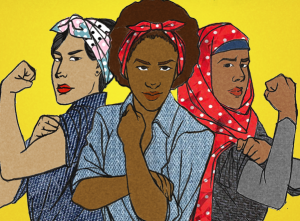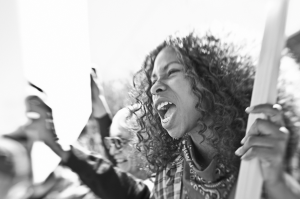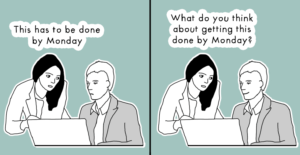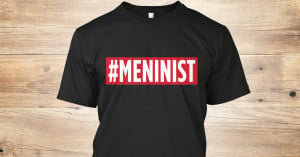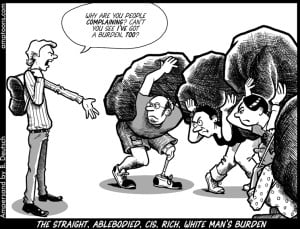Originally posted on Ms. Magazine and cross-posted here with their permission.

Photo by Flickr user Steve Meyer Photo under license from Creative Commons 2.0
(Trigger Warning: Abusive, woman-hating language, and threats of violence)
When I write about feminism and men’s violence against women, I often receive supportive comments. While some of the praise is earned, much of it gives me a lot of credit for doing very little.
When women write about those same topics, it’s a different story. We men threaten women bloggers and writers with rape and murder. We call women “man-haters,” verbally abuse them, hack into their email accounts and stalk them.
We alter photos of women, putting cuts and bruises on their faces. Then we excuse ourselves, saying we were “just joking–can’t you feminists take a joke?”
Racists harass people online; so do homophobes. Most people agree this is harassment.
But my gender’s online harassment of women seems to go unquestioned, even defended, in most circles. Yet men’s online abuse of women has been well-documented by women such as Laurie Penney, Jennifer Pozner, Emily May and many other women.
“The sad part is that it works,” says feminist blogger Soraya Chemaly. “I have spoken to many, many women writers who ‘tone down’ their voices or stop writing entirely as a result of threats. … I mean, who wants to wake up in the morning to ‘Stupid, cunt’ or ‘I’ll go from house to house shooting women like you.’”
“The death threat was pretty scary,” says HollaBack! cofounder Emily May. “And there have been several rape threats. But it’s mostly ‘I want to rape you’ or ‘Somebody should rape you.’
Most are not physical threats–they’re more about how ugly I am, how nobody would bother raping me because I’m so fat and hideous. Once, after reading all these posts, I just sat in my living room and bawled like a 12-year-old.”
Jennifer Pozner agrees. “Very rarely have I gotten negative feedback that doesn’t include either a rape threat or calling me ugly and fat. Or sometimes they tell me I’m hot, but they hate what I’m saying– they’d rather watch me on TV with the mute on.”
Pozner’s threats have not been limited to online: One man left a letter at her door saying he’d “find you and your mom and rape you both.”
Chemaly adds, “The point of the harassment, like harassment on the street, is to make the public sphere seem dangerous and to portray women as provoking a violent response through their actions.”
Pozner agrees. “It’s about the policing of women … using threats to keep us silent.”
Richard Rogers and Vanessa Thorpe called for a stop to such harassment in the Guardian two years ago. But most men have remained silent, as we do with many forms of our gender’s violence against women.
Many of us blame the victim, suggesting things women can do differently to ameliorate the problem. We tell women to grow a thicker skin, not to “feed the trolls” and not to assume all men feel that way.
Or we ride in on a white horse to “save” the poor damsels by insulting the insulters or threatening violence against those who are threatening violence.
This makes us feel better, but often does little to help the women being attacked or stop the violence from happening.
When men are harassed online, it’s often because they are speaking out against rape culture. Comedian Jamie Kilstein reports receiving a few combative emails after questioning God’s existence or challenging Glenn Beck–but he received “thousands” after challenging rape culture .
“There is a cost for betraying one’s privilege … [although] nowhere near the costs borne by the marginalized,” says Don Bell of the National Organization for Men Against Sexism:
Men could be silenced by the fear of being labeled as emasculated (weak), not linked to women sexually (gay), or dominated. …Men should be challenged to face their fears and risks because it is the right thing to do. Allying with women in support of feminist values–becoming pro-feminist–makes for better men and a better world.
Men’s online abuse results in women hesitating to write, stopping writing altogether and fearing for their physical safety. Many women have told me that such abuse doesn’t just happen when women are writing about feminism, it happens to them all the time.
Amy Davis Roth blogged about atheism and was subjected to daily harassment as a result. Roth described a “typical day” as “Wake up. Make coffee. Block hateful messages on Twitter or other social media … Make art.”
Sarah Sentilles was disparaged and ridiculed when writing about theology, attacked for being “childish,” her words called “chatter” despite her two doctorates.
In the early 90s, Rush Limbaugh popularized the term “feminazi.” Across the country, we men opened our mouths to laugh, and closed our ears to feminist wisdom.
In the name of “humor,” male comics and pundits call women names and threaten them with violence–the rest of us don’t challenge it, but further attack those who do.
When we apologize, it’s a fake apology, like comedian Daniel Tosh’s.
Ironically, when women call men out on our harassment, they are harassed even more. I wrote a Ms. blog about Tosh last year and it drew some criticism but mostly praise.
But when feminist blogger Cristy Cardinal wrote about it she was threatened with rape and murder and her email and Twitter accounts were hacked.
Yet, most men care deeply about the women and girls in our lives. It pains us to hear that you stop yourselves from writing online, walking outside or wearing certain clothing because of the harassment and violence our gender heaps upon you.
We’d rather it never happened to you, so we often pretend it doesn’t. We move from denial to anger at you for bringing it up, then from anger to bargaining–we question the statistics you cite, or distract with anecdotes of women who abuse men.
We sometimes go through the whole Kubler-Ross cycle of death and dying before we’re ready to move to “acceptance.”
But some men do not seem to care about anyone but themselves. These men seem to take glee in making anonymous online threats, sometimes as part of a political movement that refuses to acknowledge men’s violence against women as an epidemic.
Instead, they see men as the real victims–of feminism. Their self-appointed victim status gives them the right to call women names, threaten and intimidate at will.
For me as a man, the “acceptance” stage involves really listening to what women’s lives are actually like. It means getting sick to my stomach when I hear my friend Cristy Cardinal has been threatened, or admitting that I benefit from male privilege even if I don’t harass women online myself.
It means that when I laughed at Bill Maher calling Sarah Palin stupid or a bitch, I made writing and life that much harder for Soraya Chemaly.
The “acceptance” stage also means I’m ready to do something positive. It’s not enough for me to simply not harass women myself–if I don’t raise my voice when I see this, I’m letting the Limbaughs be the lone voices of my gender.
So I’m proud to be part of a growing movement of men who are listening to women, learning from women, becoming active bystanders and “aspiring allies.”
Clearly there’s no one “right” way to intervene, but I’ve already heard several suggestions.
Men, we can’t remain silent any longer. Let us:
1. Listen to women’s experience of online abuse and threats by men. Let us read articles about it – the ones linked here are a good place to start. Instead of suggesting solutions, we can take in how hurtful the comments are.
2. Reach out to the target of the abuse. Ask her what she’d like to you do, if anything.
3. Write, “I think you’re right,” in Comments sections of articles, Facebook postings etc. of feminist women. Whether or not they’ve been harassed or attacked, agree with them and do so publicly.
4. When men harass women online, speak up. We can say something like, “As a man, your harassing comment offends me,” in the Comments sections. Say how it hurts you rather than speaking on behalf of the target.
5. Name the specific silencing tactic being used: name-calling, focusing on a woman’s appearance instead of her argument, etc.
6. Use humor. We can post something like, “Dude, put down your club–your caveman is showing!” Search online for feminist comedians of all genders who have done entire routines on this.
7. Watch for “professional trolls” from the “Men’s Rights” or “Father’s Rights” groups. They will often use terms such as “misandry” and refer to the feminist movement as anti-male or the domestic violence movement as an “industry.”
8. Send supportive emails, letters, candygrams, etc. to feminist women. Thank them for the good work they are doing–not just when they are targets of online harassment, but all the time. “If you see someone doing good work, you can be sure they’re being told they’re fat and ugly,” says Emily May. “Nice emails counterbalance the noise.”
9. Flag Facebook posts (or pages) when they’re abusive. If it’s a comment, click on the X to hide the post. You then have the option to flag it as abusive.
10. If the perpetrator isn’t an individual but a company, boycott the company. Write negative reviews of it on “Yelp” or other review sites, or suggest policy or legislative changes. (See the Ecological Model for Social Change for the philosophy behind this.)
What else would women like men to do? What would you like us not to do? I’d love to hear your responses in the comments section.
[do_widget id=‘text-101′]
Ben Atherton-Zeman is a spokesperson for the National Organization for Men Against Sexism and is a public speaker on issues of violence prevention. He identifies as a “recovering sexist” and believes every man must challenge violence and sexism in the world and in themselves. He met and fell in love with his incredible wife, Lucinda, twelve years ago while they were both doing improvisational comedy in Maine. They live in Maynard, MA and have no children except themselves.
Search our 3000+ articles!
Read our articles about:
Our online racial justice training
Used by hundreds of universities, non-profits, and businesses.
Click to learn more








